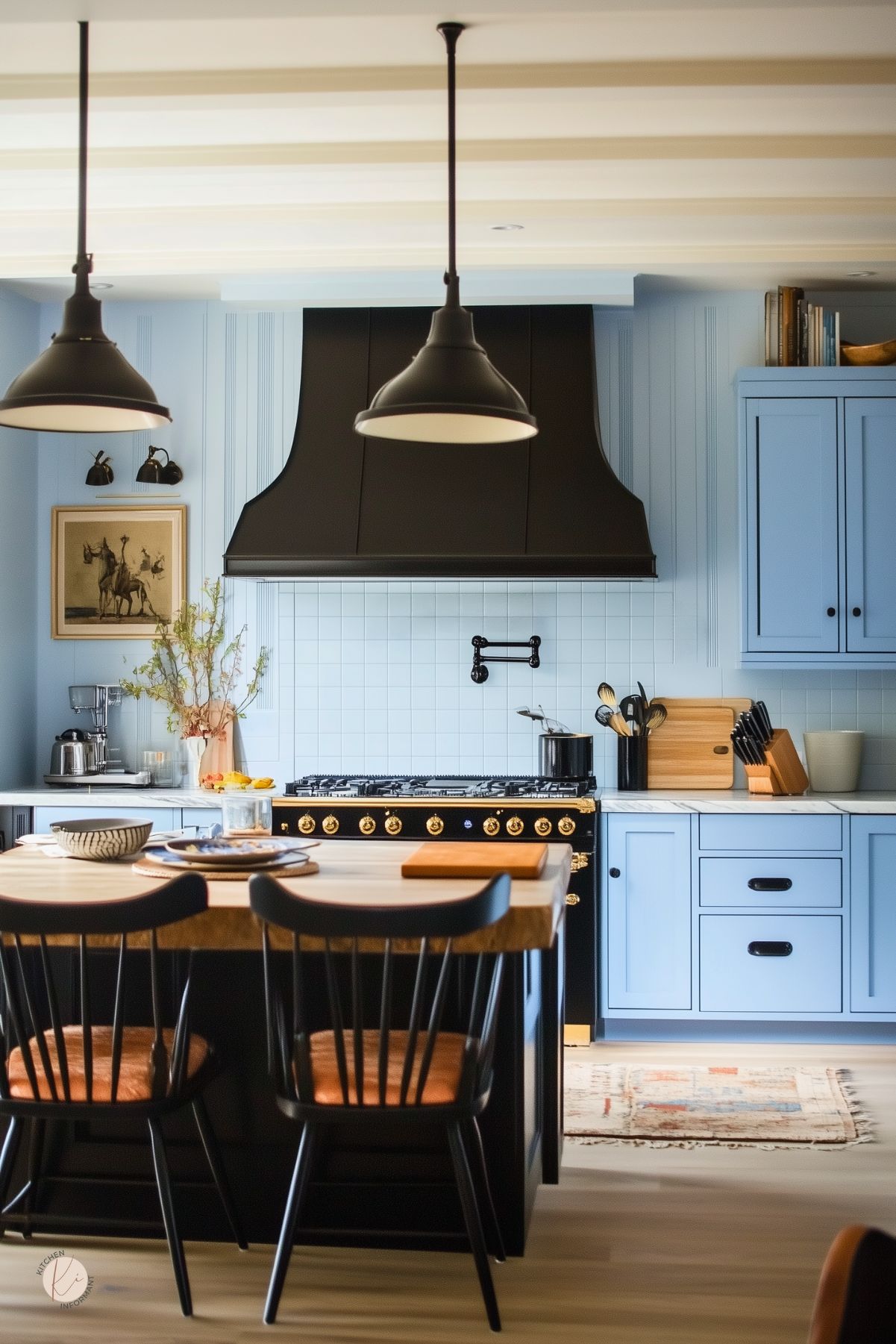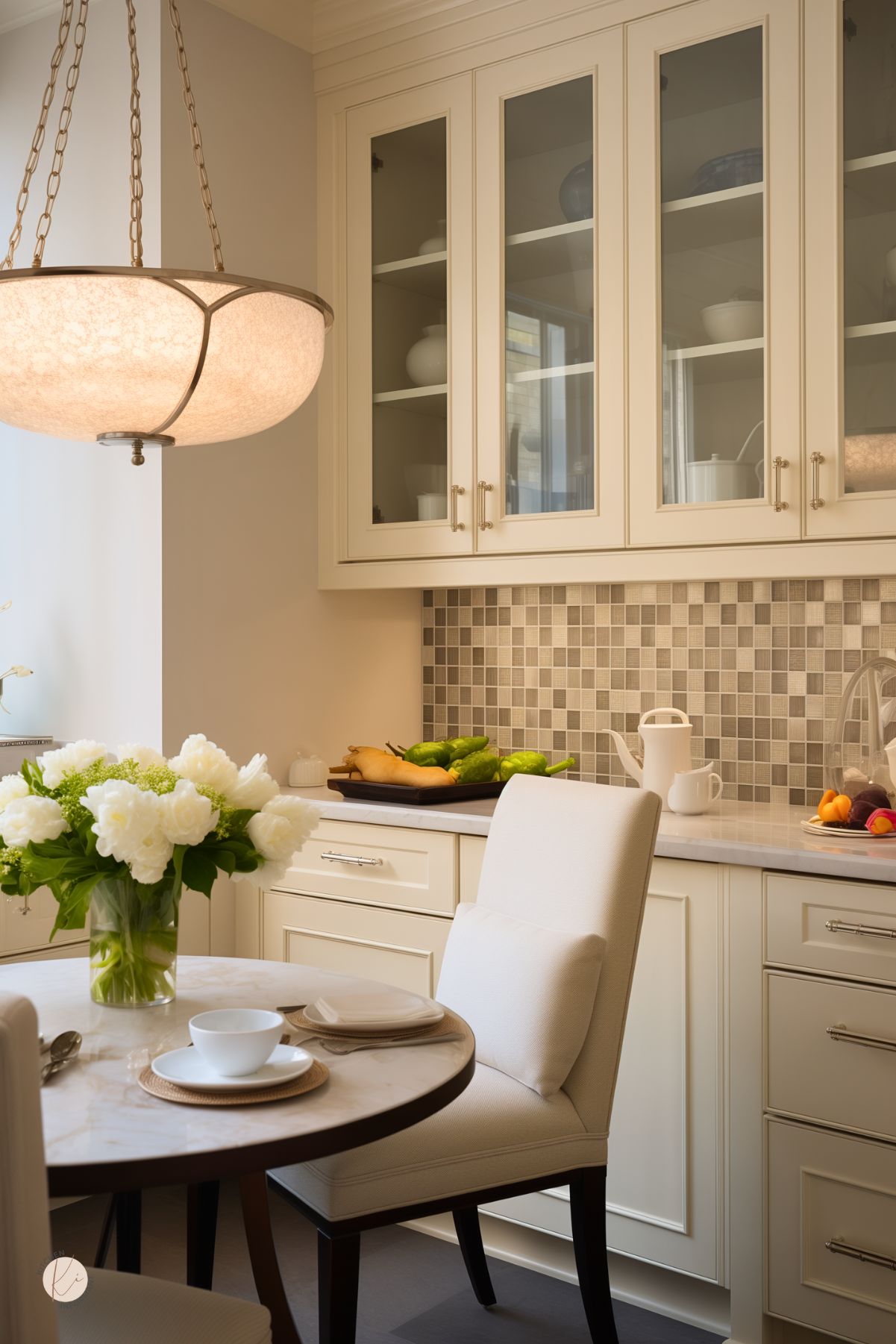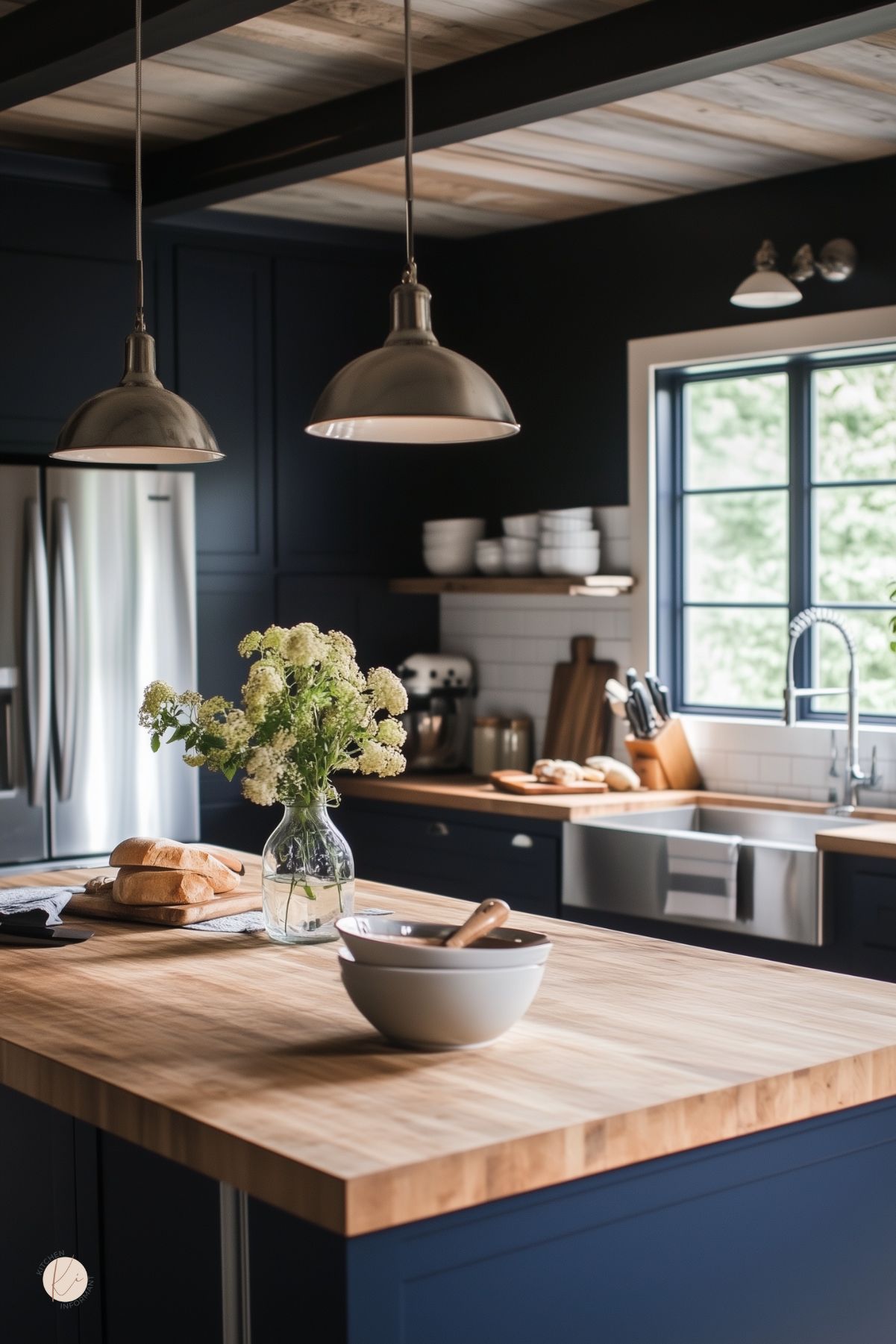All-white kitchens have become a popular choice for homeowners looking to create a fresh and timeless space.
This design trend not only brightens a room but also offers endless possibilities for personalization through texture and accessories.
An all-white kitchen can serve as a blank canvas, allowing the homeowner to easily incorporate different colors and styles over time.

From sleek modern designs to classic farmhouse looks, an all-white kitchen can fit into various aesthetics.
The clean lines and uniformity of white cabinetry and countertops provide a sense of calm and order.
Many choose to enhance their all-white kitchen with colorful decor or vibrant plants, making the space feel lively and inviting.
In today’s home design landscape, an all-white kitchen can still feel warm and cozy.
By mixing materials like wood or metals, it can transform into a unique space that reflects one’s personality.
Whether for family gatherings or intimate dinners, it’s a versatile choice that appeals to many styles and preferences.
Why Choose All-White Kitchens

All-white kitchens offer a blend of beauty, practicality, and flexibility. They can create an inviting atmosphere while also making the space feel larger and more functional.
Timeless Elegance
All-white kitchens are known for their classic and timeless appeal. This color scheme brings a fresh, clean look to any home, making it a popular choice for many homeowners.
White cabinets and countertops create a sophisticated backdrop that complements various design styles, from modern to farmhouse.
Using white allows for endless customization.
Homeowners can easily switch out accessories and decor without needing to redesign their entire kitchen.
This flexibility keeps the space feeling updated without a total overhaul.
Additionally, white reflects light, enhancing the kitchen’s brightness and warmth.
Illusion of Space
An all-white kitchen can cleverly create the illusion of more space.
Dark colors tend to absorb light, which can make a room feel smaller.
In contrast, white surfaces reflect light, making the kitchen appear more open and airy.
This effect is particularly beneficial in smaller kitchens.
By using white cabinetry and walls, homeowners can visually expand the space.
Furthermore, an all-white kitchen provides a clean canvas.
This setup means that adding colorful accents, such as vibrant appliances or painted stools, can create a striking contrast without overwhelming the room.
Versatility in Decor
One of the greatest advantages of an all-white kitchen is its versatility.
White is a neutral color that pairs well with any hue or material.
From bold, colorful decor to rustic wooden accents, any style can enhance the overall aesthetic.
Homeowners can choose different textures for countertops, cabinets, and flooring to add depth and interest.
For instance, pairing glossy white cabinets with matte finishes or natural wood can create a layered look.
This flexibility allows for creativity while maintaining a cohesive and elegant design, making it easy to refresh the space with changing trends.
Designing Your All-White Kitchen

Creating an all-white kitchen can bring a bright and airy feel to any home.
The right materials, textures, and accents can enhance the purity of the white palette while adding charm and interest.
Selecting the Right Materials
Choosing materials is essential for an all-white kitchen.
Durable options include quartz, marble, and granite for countertops.
These materials not only look stunning but also stand up to daily wear and tear.
White cabinetry can be made from wood or MDF, both providing different finishes.
Consider appliances in stainless steel or white to maintain the cohesive look.
Cabinet hardware in brushed nickel or matte finishes can add a subtle contrast without overwhelming the design.
Selecting a white backsplash such as subway or mosaic tiles can also enhance the kitchen’s overall aesthetic, providing a clean and classic look.
Textures and Layers
Incorporating different textures helps to keep an all-white kitchen from feeling flat.
Mixing elements like smooth countertops, textured cabinetry, and matte finishes can create depth.
For instance, a glossy backsplash paired with matte cabinetry offers visual interest.
Adding rugs or place mats in soft fabrics can introduce warmth and comfort.
A white kitchen can also benefit from incorporating open shelving.
Displaying white dishware or unique glass pieces allows for layering while keeping the space light.
Consider accessories like woven baskets for storage or plants for a fresh touch.
These elements can bring life to the kitchen, breaking the monotony of an all-white color scheme.
Accent Colors
Incorporating accent colors can truly elevate an all-white kitchen.
Adding subtle hints of color through decor items is effective.
For example, using pastel shades like soft blues or pale greens can create a soothing atmosphere.
Another option is to include bright accents, such as vibrant dish towels or artwork.
These pops of color can create focal points without overwhelming the space.
Additionally, consider using natural materials like wood for a warm touch.
A wooden dining table or bar stools can complement the white beautifully.
It brings a cozy feeling while keeping the aesthetic fresh and inviting.
Lighting Considerations

Lighting plays a crucial role in enhancing the beauty of all-white kitchens. A thoughtful balance of natural and artificial lighting can make a kitchen feel both bright and inviting.
Natural Light
Maximizing natural light is essential in an all-white kitchen.
Large windows can flood the space with sunlight, creating a warm atmosphere. Sheer curtains can add privacy while still allowing light to filter through.
Positioning mirrors strategically can help reflect light, making the room feel even more spacious.
Skylights are another great option. They can bring in a lot of light without sacrificing wall space.
For optimal results, consider the kitchen’s orientation to the sun.
South-facing kitchens usually enjoy the most natural light throughout the day. This can make the white surfaces glow beautifully.
Artificial Lighting Options
Artificial lighting is key for tasks and setting a mood. Layering different types of lighting can achieve a functional and attractive space.
- Task Lighting: Puck lights or under-cabinet strips are ideal for work surfaces. They illuminate countertops, making food prep easy and safe.
- Ambient Lighting: Recessed lights create a soft glow. These should be spaced 24-42 inches apart for even illumination.
- Accent Lighting: Pendant lights over islands add style. Choose larger fixtures to create a focal point.
Color temperature matters too.
Aim for lights around 2700K to 3000K, offering a warm feel that complements the white tones.
This thoughtful approach can enhance both the design and functionality of an all-white kitchen.
Maintaining Your White Kitchen

Keeping a white kitchen looking fresh and clean involves regular maintenance and attention to detail.
By following some straightforward cleaning habits, dealing with stains promptly, and considering long-term care, one can ensure their kitchen remains bright and welcoming.
Daily Cleaning Tips
To maintain the cleanliness of a white kitchen, daily cleaning is essential. It helps prevent dirt and grime buildup. Simple tasks can make a big difference:
- Wipe Down Surfaces: Use a damp cloth or a gentle cleaner to wipe countertops, cabinets, and appliances daily.
- Sweep or Vacuum: Debris can scratch surfaces, so a quick sweep or vacuum keeps the area tidy.
- Spot Clean as Needed: Address any spills or messes right away to avoid stains forming on white surfaces.
Incorporating these habits into daily routines can keep the kitchen looking its best.
Dealing with Stains
Stains can be a challenge in a white kitchen but can be managed effectively. Here’s how to tackle common types of stains:
- Cooking Grease: Use a mixture of warm water and vinegar to clean greasy spots. Spray it on the area and wipe it off after a few minutes.
- Food Stains: For stubborn food stains, a paste of baking soda and water can be effective. Apply it to the stain, let it sit, and then scrub gently.
- Surface Scratches: For minor scratches on surfaces, try using a white crayon to fill in the scratch, then buff the area with a soft cloth.
Timely attention to stains will help maintain the kitchen’s bright appearance.
Long-Term Care
Long-term care focuses on preserving the beauty of white kitchens over time. Here are some tips to keep in mind:
- Use Quality Cleaners: Opt for gentle, non-abrasive cleaners that won’t damage surfaces.
- Protect Surfaces: Consider using mats or placemats to protect areas from heat and scratches.
- Regular Deep Cleaning: Schedule deep cleaning every few months. This includes cleaning behind appliances and inside cabinets.
By being mindful of these practices, the kitchen can remain a stunning and functional space for years.
Countertops and Backsplashes

When creating an all-white kitchen, the choice of countertops and backsplashes is essential. These elements add both style and functionality, making the kitchen inviting and practical.
Material Choices
Several materials work well for countertops and backsplashes in an all-white kitchen. Here are some popular options:
- Quartz: Known for its durability, quartz comes in a variety of white shades. It resists scratches and stains, making it perfect for a busy kitchen.
- Marble: This classic choice offers stunning beauty with unique veining patterns. It requires more maintenance but provides a timeless look.
- Granite: Tough and heat-resistant, granite is available in light colors. Its natural patterns add character to the kitchen.
- Ceramic or Porcelain Tile: These tiles can mimic the look of stone and are easy to clean. They can create a seamless design when used on both countertops and backsplashes.
Choosing the right material depends on budget, style preference, and maintenance willingness.
Installation Tips
Proper installation of countertops and backsplashes is crucial for a polished look. Here are some helpful tips:
- Hire Professionals: For materials like granite or marble, hiring an expert ensures precise measurements and cuts.
- Prepare the Surface: Ensure cabinets and walls are level before installation. This step helps avoid gaps or uneven surfaces.
- Use Quality Adhesives: The right adhesive prevents tiles or slabs from shifting. Follow manufacturer guidelines for best results.
- Add a Backsplash After Countertops: Install the countertops first to ensure a clean edge for the backsplash.
- Seal Natural Stone: If using marble or granite, apply a sealant after installation to protect against stains.
These steps help create a beautiful and functional all-white kitchen space.
Cabinetry and Hardware

The choices of cabinetry and hardware significantly shape the look and feel of an all-white kitchen. Selecting the right styles and finishes can enhance the elegance while maintaining functionality.
Cabinet Styles
Various cabinet styles can elevate an all-white kitchen’s design.
Shaker cabinets are popular for their clean lines and versatility. They work well in both modern and traditional spaces.
Flat-panel cabinets offer a sleek, minimalist appearance. They are easy to clean and can add a modern touch.
Glass-front cabinets allow for creativity. These can showcase beautiful dishware or decorative elements while breaking up solid white surfaces.
Additionally, open shelving can create an airy feel and makes items easily accessible.
Choosing the right cabinet style can greatly impact the kitchen’s overall aesthetic.
Choosing Handles and Knobs
Cabinet hardware comes in many styles and finishes that can enhance or contrast the cabinets.
Metals like polished nickel and brass can add warmth and a bit of shine.
For a bold look, black hardware stands out against white cabinets. It can make a striking statement and create depth.
When selecting handles and knobs, consider the finish based on the cabinet style.
For example, shiny finishes may suit modern designs, while antique finishes can complement traditional styles.
It is also important to think about size and shape.
Larger pulls can be easier to grip, while smaller knobs can provide a subtle touch.
Mixing finishes can also add character, but it’s best to keep a cohesive look.
Flooring Options
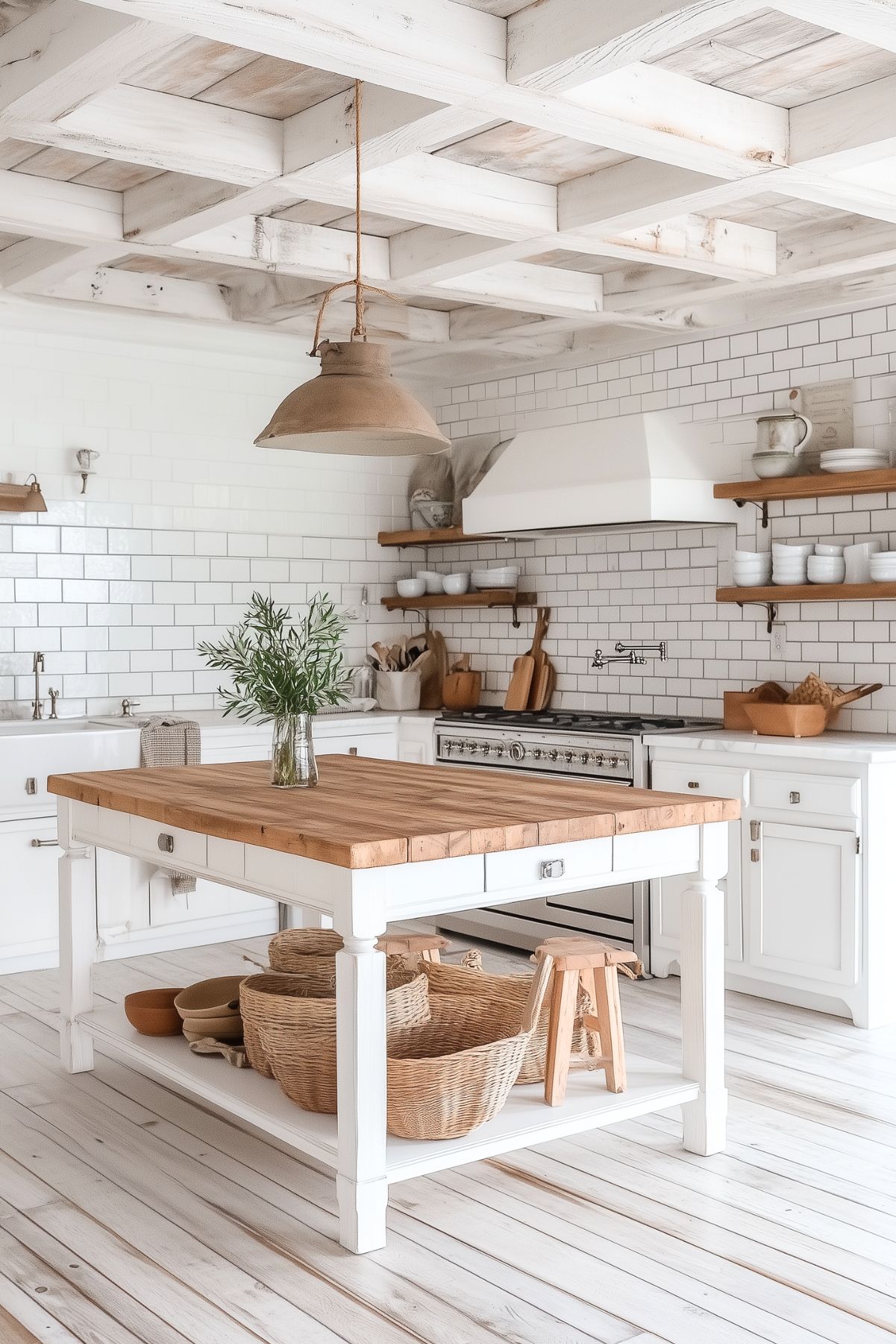
Choosing the right flooring for an all-white kitchen is important. It can enhance the aesthetic and functionality of the space.
Two key aspects to consider are color and material selection, as well as durability.
Color and Material Selection
When selecting flooring for an all-white kitchen, color and material play a crucial role.
A warm wood floor can complement white cabinets beautifully. Options like oak or maple offer a timeless look. They create a cozy atmosphere and add a natural touch.
Tile is another popular option. It comes in various colors and styles.
For instance, light gray or beige tiles can add subtle contrast. Porcelain or ceramic tiles are also durable and easy to clean.
Additionally, consider glossy finishes, which can reflect light. This can make the space feel larger.
Always choose a flooring material that fits the overall kitchen design and color scheme.
Durability Considerations
Durability is a major factor when choosing kitchen flooring. Kitchens experience high foot traffic and potential spills.
Therefore, it’s vital to select materials that can withstand daily use.
Hardwood flooring is beautiful but can be prone to scratches and water damage. Sealants can help protect it, but care is needed.
On the other hand, tile flooring offers great durability. It is resistant to moisture, stains, and scratches.
Vinyl flooring is another good choice. It is budget-friendly and available in many designs, offering a good balance of durability and style.
Ultimately, selecting the right flooring involves finding a balance between aesthetics and practicality.
Appliances and Fixtures

Choosing the right appliances and fixtures is essential for creating a stylish all-white kitchen. Careful selection can enhance the space’s functionality and aesthetic, making it both beautiful and practical.
Selecting Appliances
When selecting appliances for an all-white kitchen, many homeowners prefer stainless steel or white finishes.
These options seamlessly blend with white cabinetry, keeping the focus on the kitchen’s overall charm.
Key considerations:
- Style: Look for modern, sleek designs that complement the kitchen’s aesthetic.
- Functionality: Ensure that the appliances fit the specific needs of the kitchen.
- For example, consider energy-efficient models to save on utility bills.
- Size: Proper sizing is crucial. Measure spaces to avoid any issues with installation.
White appliances might also offer a retro touch, while colorful accents can add personality if desired.
Choosing the right combination ensures that the kitchen remains cohesive and inviting.
Sink and Faucet Styles
The sink and faucet can be focal points in an all-white kitchen. Homeowners often choose large, farmhouse-style sinks, as they provide functionality and style.
Popular options include:
- Undermount sinks: They create a seamless look with the countertop.
- Apron-front sinks: They offer a classic, stylish appeal that stands out.
For faucets, sleek, modern designs in polished chrome or matte black can create a striking contrast against white surfaces.
Important features to consider:
- Single vs. double handle: Single handles are easier to use but double handles can offer more control.
- Sprayer functionality: Built-in sprayers add versatility, especially for cleanup.
Overall, the right sink and faucet can elevate the kitchen’s style while ensuring it remains practical for daily tasks.
The Role of Color and Texture

In an all-white kitchen, color and texture play vital roles in adding depth and interest. Carefully selected color accents can brighten the space, while textural elements can enhance its warmth and character.
Using Color Accents
Color accents can transform an all-white kitchen from plain to vibrant.
A simple approach is to incorporate colorful accessories. Items like dishware, kitchen towels, and small appliances provide pops of color without overwhelming the design.
Consider using colors that complement white.
Soft pastels like mint green or blush pink work well. Darker shades such as navy blue or charcoal gray can also add sophistication.
A trendy option involves a colorful backsplash. A patterned tile or bright glass can create a striking focal point. This not only enlivens the kitchen but also adds personality to the overall design.
Adding Textural Elements
Texture brings a tactile quality to an all-white kitchen, making the space feel inviting.
Different materials can enhance the visual appeal while maintaining a cohesive look.
Incorporating wood elements is an excellent choice. Wooden beams, shelves, or a rustic table can introduce warmth. Even small wooden stools can add charm.
Using a mix of textures is key.
For instance, pairing sleek cabinets with a rough stone countertop can create contrast. Soft fabrics in curtains or cushions also contribute to comfort.
Another option is to use glass tiles or shiny metals. These reflective surfaces catch the light, adding dimension.
By combining various textures, a kitchen can feel both modern and cozy.
Final Touches
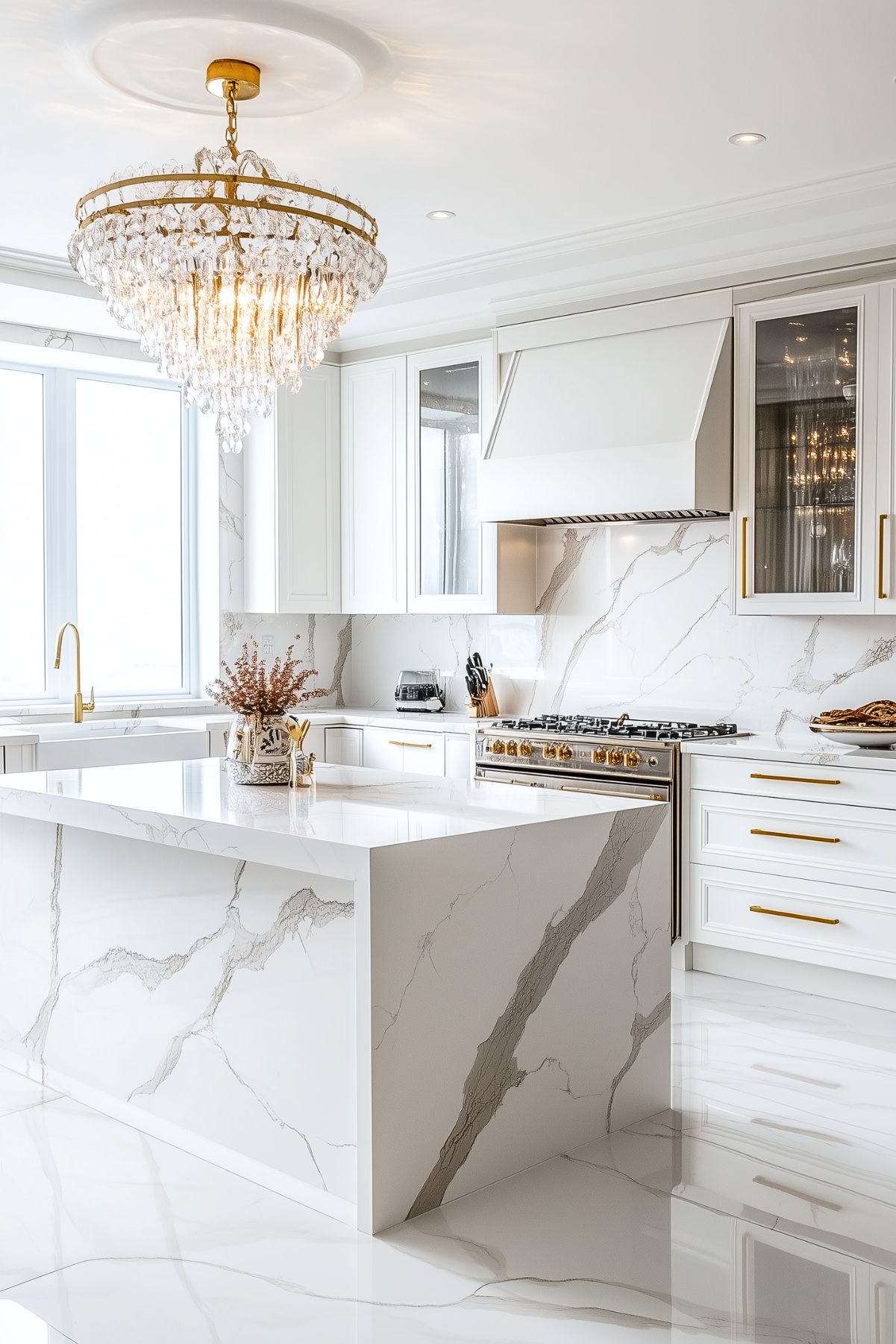
The little details can make a big difference in an all-white kitchen. Decorative accessories and organizational features are essential for creating a warm and functional space.
Decorative Accessories
Adding decorative accessories can bring personality to a white kitchen.
Choose colorful dishware, artwork, or vintage finds to create visual interest.
A few key tips include:
- Plants: Incorporating greenery, like herbs or small potted plants, adds warmth and freshness.
- Textiles: Use colorful or patterned dish towels and table runners to break up the white.
- Lighting: Unique light fixtures or pendant lights can make a striking focal point.
Balancing these elements with white cabinetry enhances the kitchen’s charm without overpowering the design.
Organizational Features
Keeping a kitchen organized is vital for functionality.
In an all-white kitchen, smart storage solutions help maintain a tidy look.
Some effective features include:
- Open Shelving: This adds depth and provides a space to display beautiful dishes or cookbooks.
- Drawer Inserts: Organizers for utensils can keep everything neat and accessible.
- Hooks and Racks: Wall-mounted items are great for easily reaching pots, pans, and spices.
These elements not only maximize space but also contribute to a cohesive feel in the sleek design of a white kitchen.








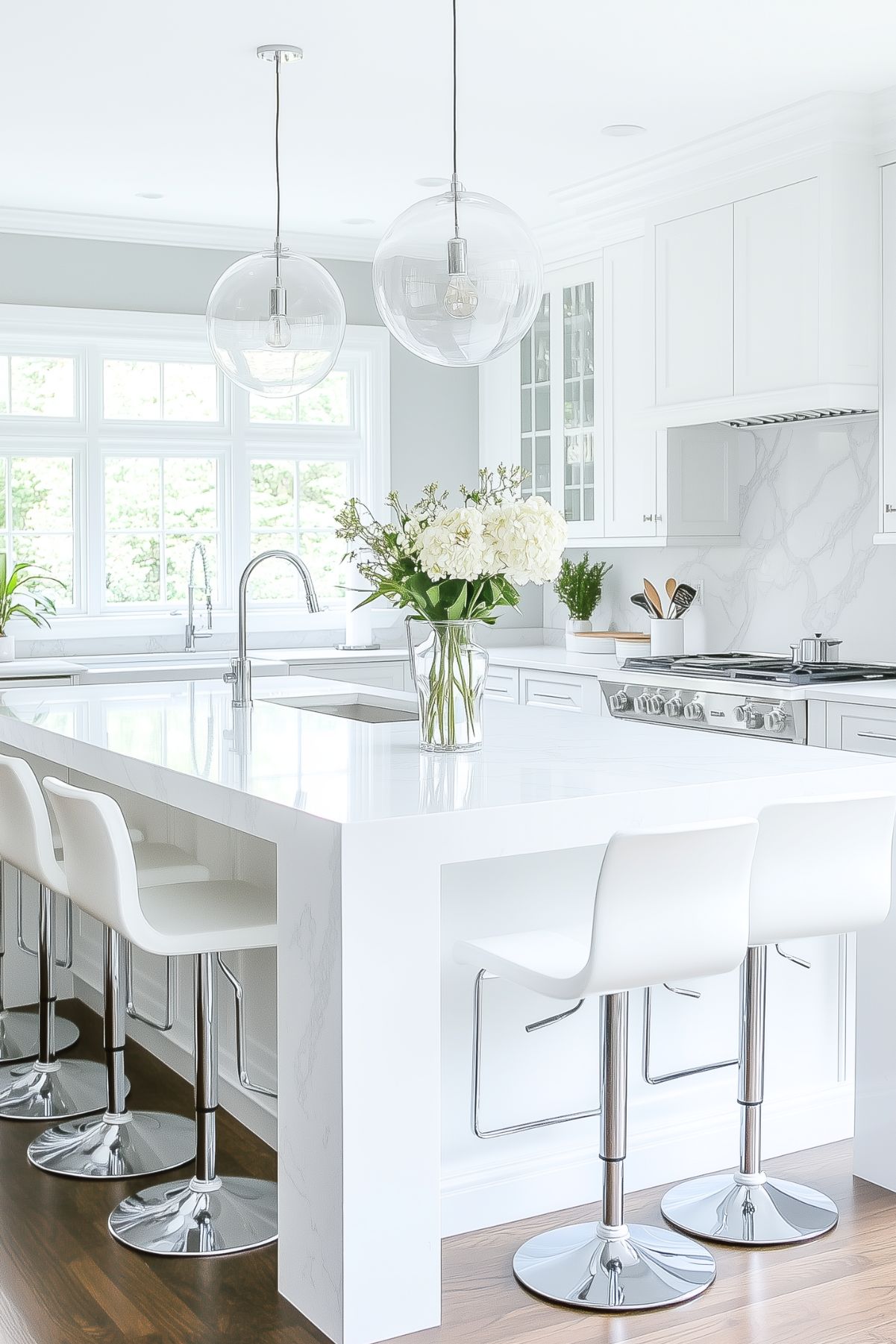

You May Also Like:




